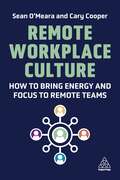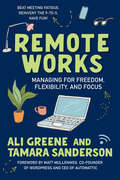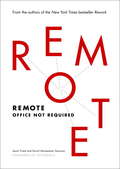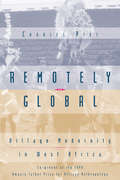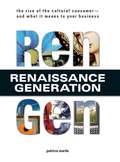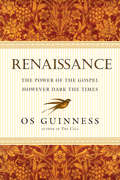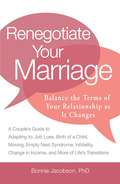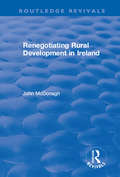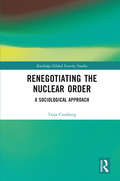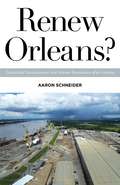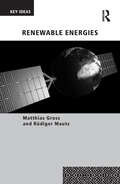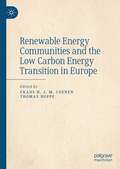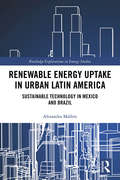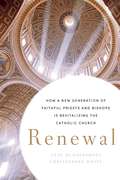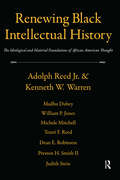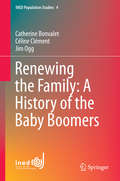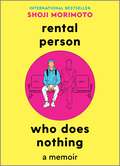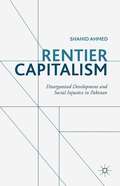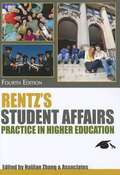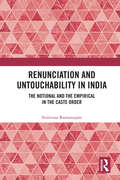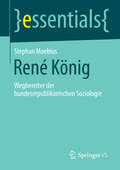- Table View
- List View
Remote Workplace Culture: How to Bring Energy and Focus to Remote Teams
by Cary Cooper Sean O'MearaThe way we work has changed and a strong, supportive company culture is key for success. When employees work remotely, even occasionally, HR professionals and business leaders need to think differently.Practitioners now need to motivate their workforce, support talent development, ensure an inclusive environment and protect their employees' mental health, all without being in the same physical space. A strong and effective company culture that is built specifically with this purpose in mind is crucial. Remote Workplace Culture is a practical guide that shows how to achieve this and explains why simply replicating what used to happen in the office in a virtual environment doesn't work. This book shows how a strong culture for remote, hybrid and flexible working helps attract the best talent, whether this is nationally or globally and explains how to prioritize inclusion. There is also specific guidance on wellbeing initiatives, how to replace social learning in a hybrid or remote working culture and how to avoid common pitfalls such as an overreliance on technology, the blurring of work/life boundaries and a misunderstanding of remote working etiquette. Supported by case studies from BBC, Salesforce, leading financial services brands and law firms, Remote Workplace Culture is essential reading for all HR professionals and business leaders needing to develop strong company culture in the new world of work.
Remote Works: Managing for Freedom, Flexibility, and Focus
by Ali Greene Tamara SandersonThe future of work is here. You can no longer survive by copying and pasting old office techniques into a digital environment; it's exhausting, unproductive, and unsuccessful. There is a better way! Are you ready to rethink everything you know about how remote works?Drawing on their years of experience working at remote companies DuckDuckGo and Automattic, plus dozens of interviews with leading experts, Ali Greene and Tamara Sanderson have written the ultimate playbook for managing remote teams. This book addresses challenges such as communicating effectively (with fewer meetings!), eliminating frustration over what tools to use, establishing team norms, and focusing on getting things done. You will learn how to work best remotely and create a workplace designed for freedom, flexibility, and focus.For decades, we've planned our lives around our work. Now it's time to intentionally design work to fit our lives.
Remote: Office Not Required
by Jason Fried David Heinemeier HanssonThe "work from home" phenomenon is thoroughly explored in this illuminating new book from bestselling 37signals founders Fried and Hansson, who point to the surging trend of employees working from home (and anywhere else) and explain the challenges and unexpected benefits.<P><P> Most important, they show why - with a few controversial exceptions such as Yahoo -- more businesses will want to promote this new model of getting things done.The Industrial Revolution's "under one roof" model of conducting work is steadily declining owing to technology that is rapidly creating virtual workspaces and allowing workers to provide their vital contribution without physically clustering together. Today, the new paradigm is "move work to the workers, rather than workers to the workplace." According to Reuters, one in five global workers telecommutes frequently and nearly ten percent work from home every day. Moms in particular will welcome this trend. A full 60% wish they had a flexible work option. But companies see advantages too in the way remote work increases their talent pool, reduces turnover, lessens their real estate footprint, and improves the ability to conduct business across multiple time zones, to name just a few advantages. In Remote, inconoclastic authors Fried and Hansson will convince readers that letting all or part of work teams function remotely is a great idea--and they're going to show precisely how a remote work setup can be accomplished.
Remotely Global: Village Modernity in West Africa
by Charles PiotAt first glance, the remote villages of the Kabre people of northern Togo appear to have all the trappings of a classic "out of the way" African culture—subsistence farming, straw-roofed houses, and rituals to the spirits and ancestors. Arguing that village life is in fact an effect of the modern and the global, Charles Piot suggests that Kabre culture is shaped as much by colonial and postcolonial history as by anything "indigenous" or local. Through analyses of everyday and ceremonial social practices, Piot illustrates the intertwining of modernity with tradition and of the local with the national and global. In a striking example of the appropriation of tradition by the state, Togo's Kabre president regularly flies to the region in his helicopter to witness male initiation ceremonies. Confounding both anthropological theorizations and the State Department's stereotyped images of African village life, Remotely Global aims to rethink Euroamerican theories that fail to come to terms with the fluidity of everyday relations in a society where persons and things are forever in motion.
Ren Gen RENAISSANCE GENERATION
by Patricia MartinRenGen provides a lens through which you can recognize and leverage the sea change occurring in your city, community, and the marketplace at large
Renaissance Man (Routledge Library Editions: Social and Cultural Anthropology)
by Ágnes HellerConsidering such witnesses of the time as Shakespeare, Dante, Petrarch, Michelangelo, Machiavelli, Montaigne, More and Bacon, Agnes Heller looks at both the concept and the image of a Renaissance man. The concept was generalised and accepted by all; its characteristic features were man as a dynamic being, creating and re-creating himself throughout his life. The images of man, however, were very different, having been formed through the ideas and imagination of artists, politicians, philosophers, scientists and theologians and viewed from the different aspects of work, love, fate, death, friendship, devotion and the concepts of space and time. Renaissance Man thus stood as both as a leading protagonist of his time, one who led and formulated the substantial attitudes of his time, and as one who stood as a witness on the sidelines of the discussion. This book, first published in English in 1978, is based on the diverse but equally important sources of autobiographies, works of art and literature, and the writings of philosophers. Although she uses Florence as a starting point, Agnes Heller points out that the Renaissance was a social and cultural phenomenon common to all of Western Europe; her Renaissance Man is thus a figure to be found throughout Europe.
Renaissance: The Power of the Gospel However Dark the Times
by Os GuinnessLogos Bookstores' 2015 Best Book in Christianity and CultureHonorable Mention, 2014 Best Book of the Year from Byron Borger, Hearts and Minds BookstoreRenaissance,no.
Renegotiate Your Marriage: Balance the Terms of Your Relationship as It Changes
by Bonnie JacobsonWhen you got married, you and your spouse made a contract. Oh, not the one you signed in church or at the registry office. It was a contract no one but the two of you knew about. One that sets the terms of your relationship. But that contract can and does change. It changes when: you or your spouse lose your job; your first child is born; the kids leave home; your spouse cheats on you. Big changes in your life mean big changes in your marriage as well. And in this guide to a happy, healthy marriage you'll learn how to renegotiate your marriage during the ups and downs of life so that it can survive. Most of all, you'll learn the secrets to renegotiating your marriage contract so both of you remain committed to a strong, healthy, and happy wedlock.
Renegotiating Contracts for the Energy Transition in the Extractives Industry (Just Transitions)
by Raphael J. Heffron Damilola S. Olawuyi Victoria R. NaluleThis book focuses on renegotiating extractive contracts to align with the net-zero goals. It delves into extractive contract negotiations in four ways which collectively represent a major research gap in literature. It focuses on extractive contract provisions and examines their alignment with net zero goals, suggesting how these provisions could be re-negotiated to ensure an effective energy transition. Consequently, the book assesses how contractual provisions are responding to, or reflecting energy transition scenarios, and highlights areas to be included or strengthened that will be beneficial for all energy stakeholders. This book goes on to discuss the energy transition global landscape. Through the presentation of case studies from different countries, the book assesses the transition risks in extractive contracts, and it uniquely provides the negotiation tools and strategies to address these transition risks.
Renegotiating Rural Development in Ireland (Routledge Revivals)
by John McDonaghThis title was first published in 2002: As rural Ireland undergoes deep-reaching changes, this book critically assesses what the author terms the "renegotiation of rural development" in Ireland through the repackaging, reproduction and representation of suggestions, ideas and alternatives for rural renewal. Deconstructing the process and practice of rural development in Ireland, the author explores the new approaches to development and the so-called desire for creating integrative policy and planning approaches. The main conduits for this investigation are those of partnership and community groups and their involvement in rural development issues. Further, through investigation of the relevant concepts and theories of rural change, the volume delves into the discourses of rurality and development and utilizes the diversity of approaches and understanding of, this increasingly complex issue.
Renegotiating the Nuclear Order: A Sociological Approach (Routledge Global Security Studies)
by Tarja CronbergRenegotiating the Nuclear Order offers a sociological approach to the nuclear order, and order defined by nuclear technology and nuclear weapons. The focus is on the need to renegotiate the nuclear order, given the conflict between deterrence and disarmament and the unbalanced distribution of rights and responsibilities between the nuclear and nonnuclear states. The study applies the concepts, a relevant social group, and a technological frame developed in the sociology of technology on the current competition between the Non-Proliferation Treaty and the Treaty on the Prohibition on Nuclear Weapons. The negotiations of the nuclear programs of North Korea and Iran form the empirical background. The policy challenges identified in the sociotechnical analysis are threefold. Firstly, there is the need to guarantee the credibility of the nuclear diplomacy in the gap between the “military” and the “peaceful”. Secondly, during the past 50 years the rights of the non-nuclear states have been undermined, while the nuclear-weapon states have ignored their disarmament obligations. There is a need to renegotiate a new balance. Thirdly, the relationship between the two treaties has to be clarified. The proposal is to clearly separate the two into a comprehensive treaty on non-proliferation and to a verifiable treaty on prohibiting nuclear weapons. This book will be of much interest to students of security studies, arms control and disarmament, sociology, STS (Science-Technology-Society) studies, and International Relations.
Renew Orleans?: Globalized Development and Worker Resistance after Katrina (Globalization and Community #27)
by Aaron SchneiderUrban development after disaster, the fading of black political clout, and the onset of gentrification Like no other American city, New Orleans since Hurricane Katrina offers powerful insight into issues of political economy in urban development and, in particular, how a city&’s character changes after a disaster that spurs economic and political transition. In New Orleans, the hurricane upset an existing stalemate among rival factions of economic and political elites, and its aftermath facilitated the rise of a globally oriented faction of local capital. In Renew Orleans? Aaron Schneider shows how some city leaders were able to access fragmented local institutions and capture areas of public policy vital to their development agenda. Through interviews and surveys with workers and advocates in construction, restaurants, shipyards, and hotel and casino cleaning, Schneider contrasts sectors prioritized during post-Katrina recovery with neglected sectors. The result is a fine-grained view of the way labor markets are structured to the advantage of elites, emphasizing how dual development produces wealth for the few while distributing poverty and exclusion to the many on the basis of race, gender, and ethnicity. Schneider shows the way exploitation operates both in the workplace and the community, tracing working-class resistance that joins struggles for dignity at home and work. In the process, working classes and popular sectors put forth their own alternative forms of development.
Renewable Energies (Key Ideas)
by Matthias Gross Rüdiger MautzRenewable Energy normally refers to usable energy sources that are an alternative to fuel sources, but without the negatively evaluated consequences of the replaced fuels. Although energy issues have a long tradition in sociology and other social sciences, it may now be high time to conceptualize these in sociological terms as the lynchpin in our understanding of the way societies are set to develop in the 21st century. This concise book focuses on sociological attempts at better framing contemporary theories of energy transformations and to deliver an accessible overview on the relationships between different types of renewable energy sources and their practical usages in modern societies. A strong focus is laid upon new forms of environmental governance and unavoidable knowledge gaps triggered by attempts to transform contemporary energy systems to renewable ones. Critical topics include the challenge of transition from centralized to decentralized system structures, the integration of renewable energies into existing energy structures or the replacement of these, coping strategies to unforeseen risks and conflict issues, and socio-cultural reservations to new technologies connected to renewable energies.
Renewable Energy Communities and the Low Carbon Energy Transition in Europe
by Thomas Hoppe Frans H. J. M. CoenenThis volume addresses renewable energy communities, and in particular renewable energy cooperatives (REScoops), in the context of the revised EU Renewables Directive. It provides a comprehensive account of the history and development of the renewable energy community movement in over six different countries of continental Europe. It addresses their visions, strategy, organisation, agency, and more particularly the challenges they encounter. This is of particular importance to gain more understanding into how renewable energy communities fare in domestic energy markets where they are confronted with regime institutions, structures and incumbents’ agency that tend to favour maintaining of the status quo while blocking attempts to empower and institutionalise renewable energy communities as market entrants having a disruptive, radical green and localist agenda. This volume will be an invaluable reference for academics and practitioners with an interest in social innovation in sustainable transitions, the role of community energy in energy markets, their agency, as well as an outlook to the impact that the EU Renewables Directive may have to change national legislation and policy frameworks to create a level playing field that is essentially more fair and beneficial to renewable energy communities.
Renewable Energy Uptake in Urban Latin America: Sustainable Technology in Mexico and Brazil (Routledge Explorations in Energy Studies)
by Alexandra MallettThis book explores the perplexing question of how to increase sustainable energy technology use in the developing world, and specifically focuses on two megacities within Latin America. Renewable Energy Uptake in Urban Latin America examines the market and uptake of two sustainable energy technologies (solar water heaters and biogas to produce electricity) in two locations, Mexico City, Mexico and São Paulo, Brazil in the 2000s. Drawing from three systems-based analytical frameworks – including one developed by the author for the purpose of this study – the book examines the varying factors affecting the implementation of renewable energy technologies (RETs) in urban Latin America. These frameworks emphasize the importance of examining socio-political dimensions; rather than conventional explanations that focus on technical and economic aspects only. By doing so, the research improves explanations about renewable energy technology (RET) adoption in the global South. These findings are useful for scholars, policy makers and practitioners working on RET adoption; resulting in a book which helps to inform wider debates regarding innovation, decarbonization, sustainability transitions and energy system change. This book will be of great interest to students and scholars of energy transitions, energy policy, development studies and science and technology studies.
Renewal
by Anne Hendershott Christopher WhiteIn the wake of the clergy abuse scandal of the last decade, many media commentators predicted the "end" of the Catholic priesthood. Demands for an end to celibacy, coupled with calls for women's ordination, dominated discussions on the effectiveness of the Catholic Church in America. Renewal argues that rather than a decline of the priesthood and a diminishing influence of the Catholic Church, we are living in a time of transformation and revitalization. The aging generation of progressives that continues to lobby Church leaders to change Catholic teachings on reproductive rights, same-sex marriage and women's ordination is being replaced by younger men and women who are attracted to the Church because of the very timelessness of its teachings.
Renewing Black Intellectual History: The Ideological and Material Foundations of African American Thought
by Adolph Reed Kenneth W. WarrenReflecting critically on the discipline of African American studies is a complicated undertaking. Making sense of the black American experience requires situating it within the larger cultural, political-economic, and ideological dynamics that shape American life. This volume moves away from privileging racial commonality as the fulcrum of inquiry and moves toward observing the quality of the accounts scholars have rendered of black American life. This book maps the changing conditions of black political practice and experience from Emancipation to Obama with excursions into the Jim Crow era, Black Power radicalism, and the Reagan revolt. Here are essays, classic and new, that define historically and conceptually discrete problems affecting black Americans as these problems have been shaped by both politics and scholarly fashion. A key goal of the book is to come to terms with the changing terrain of American life in view of major Civil Rights court decisions and legislation.
Renewing the Family: A History of the Baby Boomers
by Catherine Bonvalet Céline Clément Jim OggThis book traces the history of the baby-boomers, beginning with an explanation of the cause of the post-war baby boom and ending with the contemporary concerns of ageing boomers. It shows how the baby-boomers challenged traditional family attitudes and adopted new lifestyles in the 1960s and 1970s. Drawing on 90 interviews conducted with baby boomers living in London and Paris, the book demonstrates how their aspirations for leisure and consumption converged with family responsibilities and obligations. It shows how the baby boomers emerged from an authoritative upbringing to challenge some of the traditional assumptions of the family, such as marriage and cohabitation. The rise of feminism led by the baby-boomers is examined, together with its impact on family forms and structures. The book shows how women's trajectories veered between the two extremes of family and employment, swerving between the models of stay-at-home mother and working woman. It demonstrates how new family configurations such as solo parenting, and recomposed families were adopted by the baby boomers. Today, as they enter into retirement, the baby-boomers remain closely involved in the lives of their children and parents, although relationships with elderly parents are maintained primarily through a sense of duty and obligation. The book concludes that the baby boomers have both been influenced by and actors to the changes and transformations that have occurred to family life. They reconciled and continue to reconcile, individualism with family obligations. As grandparents often with an ageing parent still alive, the baby boomers wish to keep the independence that has been the hallmark of their generation whilst not abandoning family life.
Rengen
by Patricia MartinIdeas - and the forms in which they are expressed - are the new currency. Yet many companies, the media, and even the general population mistakenly see America as an intellectual and cultural wasteland defined by reality television and fast food. RenGen is about the rise of the next "renaissance generation" - an emerging section of the American public who are enlightened, creative, and eager to challenge the status quo.RenGen draws a new picture of the American consumer as a thinking, expressive person and examines the factors that are giving rise to this renaissance, including:a new class of workers dedicated to creating innovationa growing desire to express new ideas and concepts aestheticallyand, a new respect for learning-fueled by the Internet, a medium that links ideas, information, and visuals and connects people aross communitiesBased on original research, RenGen gives leaders a lens through which to consider important business decisions.
Rengen: The Rise of the Cultural Consumer - and What It Means to Your Business
by Patricia MartinIdeas - and the forms in which they are expressed - are the new currency. Yet many companies, the media, and even the general population mistakenly see America as an intellectual and cultural wasteland defined by reality television and fast food. RenGen is about the rise of the next "renaissance generation" - an emerging section of the American public who are enlightened, creative, and eager to challenge the status quo.RenGen draws a new picture of the American consumer as a thinking, expressive person and examines the factors that are giving rise to this renaissance, including:a new class of workers dedicated to creating innovationa growing desire to express new ideas and concepts aestheticallyand, a new respect for learning-fueled by the Internet, a medium that links ideas, information, and visuals and connects people aross communitiesBased on original research, RenGen gives leaders a lens through which to consider important business decisions.
Rental Person Who Does Nothing: A Memoir
by Shoji Morimoto***Now an International Bestseller!***"Distinctively Japanese musings on meaning and connection."—ObserverI'm starting a service... available for any situation in which all you want is a person to be there. Maybe there's a restaurant you want to go to, but you feel awkward going on your own.Maybe a game you want to play, but you're one person short.Or perhaps you'd like someone to keep a space in the park for your cherry blossom viewing party...Shoji Morimoto was constantly being told by his boss, "It makes no difference whether you&’re here or not," and that his presence contributed nothing to the company. Morimoto began to wonder whether a person who "does nothing" could still have actual value and a place in the world. Perhaps he could turn "doing nothing" into a service? With one tweet, Rental Person was born.Rental Person provides a fascinating service to the lonely and socially anxious. This book details thousands of his true-life adventures: Accompanying a divorcee to her favorite restaurant Waving goodbye to a client from the train platform Sitting in the courtroom during a client&’s trial Supporting a client during a difficult surgeryRental Person is dependable, nonjudgmental and committed to remaining a stranger, and the curious encounters he shares are revelatory about both Japanese society and human psychology.In Rental Person Who Does Nothing, Morimoto chronicles his extraordinary experiences in his unique line of work and reflects on how we consider relationships, jobs and family in our search for meaningful connection and purpose in life.
Rentier Capitalism: Disorganised Development and Social Injustice in Pakistan
by Shahid AhmedSince the early 1950s East Asia (China, Taiwan and South Korea) and South-East Asia (Indonesia, Malaysia, Thailand and Vietnam) have, despite war and other challenges, managed to transform the lives of their people, whereas South Asia (India, Pakistan, Bangladesh and Sri Lanka) has lagged behind. The success of East and South-East Asia has not been accidental – it has been driven by action to reduce rural poverty, by the provision of decent education and health services to the people, and by high quality physical and institutional infrastructure, such as roads, ports and railways, and targeted support from the State to develop particular industries. In contrast, Pakistan has never confronted the problem of rural poverty, nor invested in public services. This failure is a reflection of the power of the landed class and its urban allies. This has now taken the form of widespread rent-seeking in the economy with the country's ruling elite sharing out the spoils amongst themselves rather than taking measures to grow the size of the economy so that all might share in the resulting prosperity.
Rentz's Student Affairs Practice in Higher Education
by Associates Naijian ZhangThe mission of this new fourth edition is to provide the reader with a solid foundation in the historical and philosophical perspectives of college student affairs development; assist the reader in understanding the major concepts and purpose of student affairs' practice, methods, and program models; enable the reader to conceptualize the theme, or the fundamental framework of student affairs administration, its roles and functions in higher education; start the new professional on the journey toward skilled student affairs practice; and facilitate the reader's comprehension of the trends and issues of each respective division of student affairs in higher education. <P> Student affairs administrators will find the 14 chapters in the book, six of which are completely rewritten, very helpful in furthering their understanding of major functions in the field. The first two chapters provide the philosophical and historical tools to clarify assumptions, values, and concerns. The enrollment management chapters on admissions, financial aid, academic advising, and orientation interweave conceptually into one package loosely constructed at some institutions and tightly constructed at others. Residence life, orientation, judicial affairs, career services, student activities, financial aid, and multicultural affairs provide an interesting, united focus on learning and living skills. Chapters on counseling, career services, and health services focus on an integrated, wellness orientation to life. The final chapter examines social justice, student learning, and professionalism. <P> This outstanding text has been designed for both master's and doctoral-level students completing graduate courses in the areas of college student personnel, student affairs, student development, higher education administration, and student affairs counseling. The book is also designed to assist practitioners who may not have sufficient background knowledge in these fields and student affairs professionals who may use the book for continuing professional development.
Renunciation and Untouchability in India: The Notional and the Empirical in the Caste Order
by Srinivasa RamanujamThis volume develops a historically informed phenomenology of caste and untouchability. It explores the idea of ‘Brahmin’ and the practice of untouchability by offering a scholarly reading of ancient and medieval texts. By going beyond the notions of purity and pollution, it presents a new framework of understanding relationships between social groups and social categories. An important intervention in the study of caste and untouchability, this book will be an essential read for the scholars and researchers of political studies, political philosophy, cultural studies, Dalit studies, Indology, sociology, social anthropology and Ambedkar studies.
René König: Wegbereiter der bundesrepublikanischen Soziologie (essentials)
by Stephan MoebiusDieses Essential bietet einen ersten Einstieg in Leben und Werk des wirkmächtigen Soziologen René König. Dargestellt wird, dass René König und seine »Kölner Schule«, neben der »Frankfurter Schule« um Theodor W. Adorno und Max Horkheimer sowie neben Helmut Schelskys Soziologenkreis, zu den drei zentralen soziologischen Denkschulen der westdeutschen Nachkriegszeit gehören. König war maßgeblich für die Professionalisierung, Internationalisierung, Institutionalisierung und Konsolidierung der Soziologie in der Bundesrepublik verantwortlich. Dennoch gibt es kaum Einführungen oder Überblicke zu René König.
